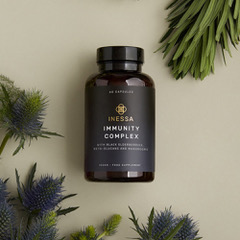With sniffle season upon us, it’s an important time of year to focus on supporting our immune system. Good hygiene practices are essential. However, there are also many well-researched diet and lifestyle measures we can take to optimise our natural defenses. Here are some of the top immunity tips to help increase our resilience to seasonal bugs, and speed recovery. Here are a few:
Guest blog by Aliza Marogy Founder of Inessa and Registered Nutritional Therapist / Naturopath
www.inessawellness.com
Aliza Marogy, 38, founded Inessa in 2017. Aliza’s journey into nutrition started at an early age. As a teenager she was diagnosed with the autoimmune condition ulcerative colitis. The medication made her lose her hair, and the prognosis involved life changing surgery. Instead she undertook her own research. This lead her to make dramatic changes to her diet and lifestyle to help manage her condition. She has not had to take medication for over 20 years. It was this experience that led her to train as a Nutritional Therapist and qualify in 2009. Her clinic specialises in gut health as well as connected inflammatory conditions. It was whilst practicing that she was inspired to launch her own clinical strength, high quality supplement brand. In 2017, her vision came to life and she launched Inessa.
As an expert in nutrition, here are Aliza’s top immunity tips…

15% off all products
Offer ends 3rd November 2021
Use Discount Code: Dynamic15
Make sleep a priority
We’re all aware that sleep is essential for us to feel and operate at our very best. Mood and mental function are heavily influenced by our slumber patterns, and without it, it’s tough to power through the day feeling fresh and energised. But did you know that sleep is essential for helping the body to regulate immunological responses? Research shows that failure to regularly get a full night’s rest makes us more susceptible to catching viruses, so it goes without saying that prioritising our sleep hygiene is key to staying healthy – particularly during the winter months.
If you struggle to settle into a deep sleep, there are many things that you can do to help, including lights out at a sensible time to allow for at least 8 hours in bed, switching out screen time for a book an hour before lights out, and steering clear of caffeinated food and beverages after midday. Supplementing with magnesium ½ an hour before bedtime helps maintain healthy levels of the neurotransmitter called GABA, to calm the nervous system and encourage sleep, and don’t forget to get exposure to natural light during the day – especially in the morning – as this is essential for regulating melatonin, the hormone that helps us sleep.
Know your vitamin D Status
Without testing, it’s impossible to know whether your vitamin D levels are within a healthy range, so it’s worth getting a test once or twice a year to find out, and this will allow you to safely supplement with an appropriate dose where necessary. Although we can get a little vitamin D from foods such as dairy, oily fish, egg yolks, and mushrooms, most of our vitamin D is made by the body in response to our skin being exposed to sunlight. For this reason, owing to our weather, PHE advises that we all take a supplement during the autumn and winter months, and some people who may be at greater risk of deficiency should use a vitamin D supplement throughout the year.
This year, I think testing and supplementing the right amount for our needs will be particularly important. In the UK, we had fewer sunny days than usual last summer, and more of us have the potential to be low on what is one of the most important compounds for healthy immune function.
Make sure your vitamin D supplement contains the superior, more bioavailable D3 form in place of vitamin D2, which can be harder for the body to utilise.
Make the most of plant power
It may sound dull, but a diet that is abundant in a wide variety of plants – vegetables, fruit, nuts and seeds, whole grains, beans and pulses – and low in processed foods, is best for health. Not only does eating a diet rich in a wide variety of plant foods mean that you’re ingesting a broad variety of bug-busting polyphenols, vitamins, and minerals, but eating this way is also known to help support a healthy microbiome, which plays a significant role in healthy immune function.
When it comes to immunity, a lot of focus falls on specific nutrients such as vitamin C, zinc, and selenium. Whilst it’s true that eating foods rich in these nutrients is important to support healthy immune function, bear in mind that our immune system is complex, and is powered by a whole spectrum of nutrients that can be obtained through diet, which is why eating a broad variety of plant foods is so important.
Omega 3 isn’t just critical for the heart & brain
The omega 3 fatty acids EPA and DHA are renowned for their role in brain, cardiovascular, and eye health, but did you know that they also play a part in healthy immune function? Studies indicate that these omega 3 fatty acids enhance and support the function of our immune cells, giving yet another good reason to make sure you’re getting enough. Omega 3s need to be obtained either through diet or quality supplements.
The richest food source of omega 3s, is oily fish. Those who aren’t vegetarian or vegan should tuck in to sardines, herring, mackerel, trout and salmon. There are plant-based sources of another essential fatty acid called ALA (alpha-linolenic acid), which the human body can convert to EPA and DHA. However, this conversion results in much lower total dietary intake of EPA and DHA. Ideally, those who don’t eat oily fish, should supplement with an algae-based vegan omega 3 supplement, alongside plant sources of ALA in their diet. Foods to regularly incorporate into meals include flax and chia seeds, avocados, and walnuts.
The humble oat has surprising immune benefits
There’s nothing like starting off a winter’s day with a bowl of porridge. Hearty and warming, it also happens to be packed with fibre to support gut health, as well as beta-glucans. Beta-glucan is a type of soluble fibre found in some grains, mushrooms, and yeast – with oats being a particularly great source. In addition to having been shown to support healthy cholesterol levels, beta-glucans are recognised for assisting the normal function of the immune system. If you’re not a fan of porridge or mushrooms, beta-glucans can also be purchased as supplements.
Granny was right about chicken soup
The healing effect of this age-old remedy is more than just an old wives tale – it’s been studied and shown to help speed recovery from coughs and colds. Not only is it full of vitamin-packed vegetables, but chicken is high in protein and contains amino acids for us to make antibodies and T-cells, and the warm broth can help loosen mucus and ease congestion. Add in lots of garlic, ginger and turmeric for their antiviral, antibacterial and anti-inflammatory properties, and to help clear a stuffy nose – some chilli.
Curcumin, from turmeric, has been shown to support the immune system by modulating the activation of T cells, B cells, macrophages, neutrophils and natural killer cells, and of course, garlic is renowned for its antiviral and antibacterial properties. Its’ immunity benefits are mostly down to a compound called allicin, which is produced when fresh garlic is chopped or crushed, but there’s a caveat. Cooking garlic immediately after crushing destroys the sensitive enzyme within that is responsible for producing allicin. Raw garlic is best, but if you add it to a nutritious soup or stew, make sure that you mince the cloves and allow the garlic to stand for about 10- 15 minutes before cooking, as this allows time for allicin to form, and provides you with more benefits. I like to add mine into soup right at the end, when serving.
Good gut health is essential for healthy immune function
When it comes to immunity, good gut health is key. The health and balance of the gut microbiome is known to play a significant role in our overall immune function. Consuming a diet packed with a wide variety of fibre-rich plant foods – including everything from fruit and vegetables to herbs (fresh or dried), grains, beans, and pulses) is one of the best ways to support your gut microbes. But other lifestyle measures such as moderating alcohol consumption and regularly getting good sleep, all contribute.
Some people with digestive issues may benefit from specific, well-researched strains of probiotic bacteria. These have been studied and shown to support immunity, and from consuming foods which naturally contain ‘good’ bacteria. Live yoghurt, kefir, sauerkraut, and kombucha are good options.
To get the most out of these top immunity tips, we are offering 15% off all products from Inessa. These supplements are designed to aid in boosting your immunity to support health and wellbeing.
15% off all products
Offer ends 3rd November 2021
Use Discount Code: Dynamic15
Buy now
While looking after your health, why not make an impact to your physical fitness? Dynamic Pilates TV has hundreds of hours of Pilates content from worldwide experts.
Guest blog post by Aliza Marogy
Founder of Inessa and Registered Nutritional Therapist / Naturopath
Founded in 2017 by Registered Nutritional Therapist Aliza Marogy, Inessa is an award winning, clinical supplement brand. It is renowned for using the highest quality ingredients in clinically relevant doses. Inessa is formulated with no preservatives or nasties. As a practitioner and IBD patient, Aliza spotted a gap in the market for optimally-dosed, high quality supplement combinations. Aiming to support her clinical practice and reduce cost for clients. The Amazon No1 best selling vitamin and Vegan Society accredited brand has most recently won 6 Beauty Shortlist Awards.
The range includes:
- Advanced Multivitamin
- Advanced Omega 3 Fish Oil
- Advanced Daily Biotic
- Advanced Biotic Complex
- Biosoothe
- Immunity Complex
- Pregnancy Multinutrient.
Inessa is a No.1 selling Amazon brand. Award winning clinical supplement range with 7 products that can be used for a wide range of wellness goals. www.inessawellness.com




